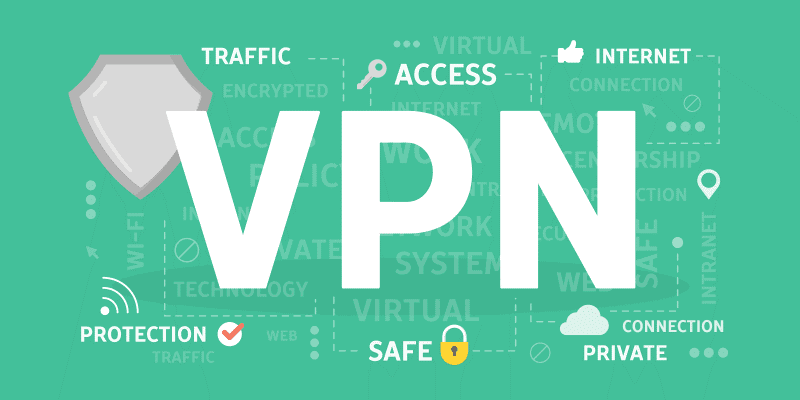VPN stands for ‘virtual private network’. It is a piece of software that can make you more secure online, encrypts all of your internet traffic. In addition, it tricks your laptop or mobile device into believing it’s somewhere else.
How Does It Work?
A VPN builds an encrypted connection between you and a remote server run by a VPN provider. It tunnel carries all of your internet traffic, so your data is safe from prying eyes along the way. Since your traffic exits the virtual private network server, your machine appears to have the server’s IP address, which masks your identity and location.
If you browse the web when connected to a VPN, your device uses the encrypted VPN link to access the web site. Then it will send you the request and forwards the website response back via the encrypted link. When you use a US-based VPN to access Netflix, your link would be seen by Netflix as originating from inside the USA.
How data transfer with and without a VPN

Internet today allows us to do many things. From online shopping and paying bills to banking, so many acts are rapidly moving online. Therefore, we share valuable information like credit card and social security numbers daily.
You might think that HTTPS does the job. However, HTTPS secures information that is shared between a person’s web browser and a web site for the uninitiated. The user address bar is marked in green and a padlock icon. Although this provides more protection, your data will still be vulnerable especially while using public Wi-Fi.
Without a VPN, you’re exposed to a lot of vulnerabilities. Your ISP can see what you’re doing while you’re surfing at home, and is probably logging everything. Places with public Wi-Fi hotspots, are particularly susceptible to hackers who can quickly set up fake convincing hotspots.
On the other hand, the data is not exposed while you’re using a VPN. Your data should have its root in your VPN server. When using a VPN, ISPs and hackers unable to monitor and record your online activities nor will confidential information be taken. Even if data is intercepted, it is encrypted and without a decryption key it looks like nonsense to everyone.
Other Example Uses for VPNS
- Connect a business network when travelling. Business travellers also use VPNs to access their business network while on the road, including all its local network tools. As it will not expose your local resources to the internet which improves data protection.
- Access your home network while travelling. You may even set up your own VPN while you are traveling to access your own network. It will allow you to access the Internet from a Windows Remote Desktop, use local file shares and play games over the Internet as if you were on the same LAN (local area network).
- Hide Your Browsing Activity From Your Local Network and ISP. If you are using a public Wi-Fi conection, your surfing behavior on non-HTTPS websites is clear to anyone that knows how to look. If you want to have more privacy from your browsing activity, you can connect to a VPN. Only a single stable VPN connection may appear to the local network. All the other traffic will travel over the VPN connection. Although this can be used by your Internet service provider to bypass connection-monitoring, bear in mind that VPN providers can opt to log the traffic to their ends.
- Access Geo-Blocked Websites. If you’re an American trying to access your Netflix account when traveling out of the country or you’d like to use American streaming outlets such as Netflix, Spotify, and Hulu. Then, you’ll be able to access these region-limited services if you’ connect to a US-based VPN.
- Bypass Internet Censorship. Many Chinese citizens are using VPNs to cross China’s Great Firewall and gain access to the entire Internet.
- Downloading File. Most people download files via BitTorrent using Virtual Private Network connections. It can potentially be useful even if you are downloading legal torrents entirely – if your ISP is throttling BitTorrent and making it incredibly sluggish, you can use BitTorrent on a VPN to get faster speed.
Final Thoughts
A Virtual Private Network ( VPN) is a protected connection between you and the internet. This offers more anonymity, protection and freedom online to its users. There are many ways to set up a VPN connection but most private users subscribe to a VPN provider.


